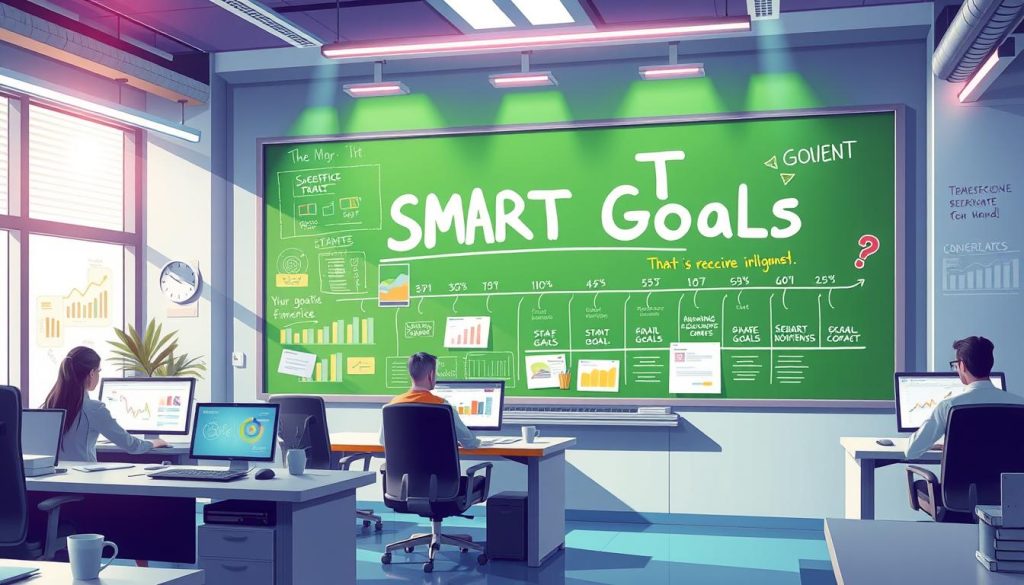Ever struggle to stay motivated at work? Many people face this issue, but there are ways to overcome it. We’ll share effective strategies to boost your motivation and success at work.
Key Takeaways
- Setting achievable goals and tracking progress can enhance motivation and performance
- Maintaining a healthy work-life balance and practicing self-care can improve overall productivity
- Fostering strong workplace relationships and celebrating small wins can boost engagement and morale
- Staying organized, minimizing distractions, and creating a positive work environment can contribute to increased motivation
- Continuous learning and personal development opportunities can lead to increased motivation and job satisfaction
Understanding Work Motivation Fundamentals
Motivation drives our actions and decisions, especially at work. It can be split into two main types: intrinsic and extrinsic motivation.
Types of Workplace Motivation
Intrinsic motivation comes from within. It’s about wanting to do a task for personal reasons like growth or satisfaction. Extrinsic motivation, however, comes from outside. It’s about rewards, recognition, or promotions.
The Psychology Behind Work Drive
The psychology of work motivation is complex. Knowing your purpose can be a strong motivator. Feeling connected to a company’s values can also boost engagement.
Impact on Professional Performance
Motivation affects how well we do at work. Motivated people are more productive and creative. But, unmotivated employees can harm the team and lead to more leaving.
To keep employees motivated, companies need to support both types of motivation. This means giving meaningful tasks, growth chances, and praise for good work. Leaders who understand motivation can help their teams succeed and grow.
Setting Achievable Goals and Milestones
Starting your professional journey often begins with setting SMART goals. These goals are Specific, Measurable, Attainable, Relevant, and Time-bound. By breaking down big projects into smaller tasks, you create a clear path to success. This keeps you motivated as you move forward.
Setting small, measurable milestones is a great goal-setting strategy. For instance, aiming to boost productivity by 10% or getting a relevant certification can be big steps. These milestones give you chances to celebrate your progress.
Improving your emotional intelligence at work can help with setting goals. Better self-awareness, empathy, and communication skills can improve teamwork and client relations. These skills are key to professional success.
Practicing mindfulness, like meditation or deep breathing, can also help. It keeps you focused and reduces stress. This improves job satisfaction and morale at work.
- Enhance professional knowledge and skills
- Improve productivity and efficiency
- Prioritize professional self-care and well-being
- Strengthen communication and interpersonal skills
- Expand professional networks and connections
- Master new technologies or software relevant to your role
Setting realistic and achievable goals helps you feel accomplished and keeps you motivated. Telling someone about your goals, like a mentor or coach, can help you stay on track. Celebrating your milestones shows the value of setting goals well.

“Setting achievable goals is the first step in turning the invisible into the visible.”
The secret to reaching your potential is breaking down big dreams into SMART goals and milestones. These keep you motivated and on the right path.
Creating an Optimal Work Environment
Making your work space the best it can be is key to being more productive and focused. It helps you avoid distractions and feel more satisfied with your job. By organizing your area, managing distractions, and creating a good atmosphere, you can do better at work and feel happier.
Organizing Your Workspace
Having a workspace that fits you well can really boost your productivity. Furniture that’s good for your body and natural light can make you feel better and more energetic. Keeping the room at a comfy temperature and controlling the noise helps you concentrate better and avoid distractions.
Minimizing Workplace Distractions
Today, distractions at work can really slow you down. Turning off notifications, focusing on your work, and using digital tools can help keep things smooth. Also, using systems to book meeting rooms can help avoid scheduling problems and save time.
Establishing a Productive Atmosphere
The vibe of your workplace is very important for how motivated and happy your team is. Studies show that a good work environment can make your team up to 12 percent more productive. Good communication, supportive leaders, and recognizing your team’s efforts can make everyone feel valued and work better together. As more people work from home, it’s important for companies to support them well to keep a positive work atmosphere.
By making your workspace better, cutting down on distractions, and creating a good work environment, you can achieve more and be happier at work. This will help you succeed in your career.
| Workspace Optimization Strategies | Benefits |
|---|---|
| Ergonomic Furniture | Reduced musculoskeletal issues |
| Natural Lighting | Enhanced mood and energy levels |
| Noise Management | Improved concentration and focus |
| Comfortable Temperature | Enhanced cognitive performance |
| Digital Signage | Fostered transparent work culture |
| Meeting Room Booking | Prevented conflicts and saved time |
“A positive work environment can lead to up to a 12 percent increase in staff productivity.”
Building Strong Workplace Relationships
Creating a strong community at work can really boost employee motivation and productivity. It also helps keep employees around longer. By focusing on getting along with coworkers, you make your team stronger and more successful together.
Strong relationships at work make teamwork better. When you know your coworkers well, working together becomes easier. This leads to better communication, sharing, and reaching goals together.
Good relationships at work also make everyone more productive and happy. When people get along, they can do more in less time. A positive work environment comes from coworkers who like each other.
Creating a sense of community at work can also keep employees happy and loyal. Feeling connected to both the job and coworkers helps keep people around. Happy coworkers enjoy their jobs more and feel less stressed.
To build strong relationships, focus on clear communication, empathy, and solving problems. Open and regular talks between managers and team members help build trust and a good company culture. Showing support and understanding also strengthens relationships and boosts morale.
By valuing teamwork, community, and good relationships, you create a workplace that inspires and succeeds.

| Benefit of Strong Workplace Relationships | Impact |
|---|---|
| Improved Team Collaboration | Easier to work with colleagues on a deeper level, enhancing communication and teamwork |
| Increased Productivity | More work accomplished in less time due to positive relationships |
| Enhanced Workplace Morale | Better work environment when colleagues genuinely like each other |
| Improved Employee Retention | Employees feel connected to both the work and the people they work with |
| Enhanced Employee Well-being | Positive relationships reduce stress and increase job enjoyment |
“Strong workplace relationships are essential for fostering a positive and productive work environment. By prioritizing interpersonal connections and cultivating a sense of community, organizations can unlock the full potential of their teams.”
Personal Development and Career Growth
Learning new things and improving your skills are key for career advancement and professional development. By seeking out skill acquisition chances, you can get better at what you do. This boosts your confidence and motivates you at work.
Skill Enhancement Opportunities
Personal growth can improve many important skills like time management and communication. It also helps with critical thinking and being adaptable. Getting better at leadership can also motivate your team and make work more productive.
Being an expert in your field makes you better at making decisions and understanding projects.
Professional Learning Pathways
Looking into professional learning chances, like going to industry events or joining groups, can open new doors in your career. Reading books, listening to podcasts, and staying up-to-date with news can also help you grow in your field.
Setting Development Goals
Creating a personal development plan helps you set goals and track your progress. It also helps you keep improving your skills and motivation. Making sure your goals match the company’s goals helps everyone succeed.
Investing in your growth is a smart move for career advancement, better job performance, and a happy work-life balance.
“Continuous self-assessment and improvement are key components of personal development.”
| Skill Enhancement | Professional Learning |
|---|---|
|
|
By focusing on your growth, you can find new chances for career advancement, improve your professional development, and keep learning valuable skills.
Maintaining Work-Life Balance
Keeping a balance between work and personal life is key to staying motivated and happy at work. Stress management, employee well-being, and work-life integration are important for professionals to do well in their jobs and personal lives.
Not having a balance can make you unhappy at work, leading to less productivity and health problems. A good balance stops burnout, helps you grow, and keeps you motivated at work. Doing things outside work can also improve your skills like talking, understanding others, and leading.
To balance work and life, you can share tasks at work to ease pressure and help your team. Getting support from family, friends, and work networks is also helpful. Setting clear work and personal time boundaries is crucial. Taking care of yourself and saying no to too much is important for finding balance.
Learning to manage your time better can make you more productive, less stressed, and give you more time for hobbies. Talking openly with your boss and colleagues about flexible work options is key to balancing work and life.
A study by the U.S. Travel Association found 55 percent of employees have unused vacation days. Offering flexible work options can help employees balance work and life better. Many employers now offer more flexibility in work schedules and locations, especially after the COVID-19 pandemic.
Employers who support work-life balance can save money, have less absenteeism, and have a more loyal and productive team. But, employees might worry that taking time off will cause work to pile up.
| Benefit | Description |
|---|---|
| Increased Productivity | Employees with a good work-life balance are more focused and efficient, leading to better work results. |
| Reduced Stress and Burnout | Having a balance helps reduce stress and prevents burnout, improving mental health and well-being. |
| Improved Retention and Loyalty | Employees who feel supported in their work-life balance are more likely to stay, reducing turnover and keeping knowledge and skills within the company. |
| Enhanced Collaboration and Teamwork | When employees balance work and personal life, they are more engaged and willing to work together, creating a positive work environment. |
By focusing on stress management, employee well-being, and work-life integration, companies can create a culture where employees thrive both at work and in their personal lives, leading to long-term success.
Recognizing and Celebrating Achievements
It’s powerful to celebrate what employees achieve. This boosts their motivation and makes them happier at work. When they feel valued, they tend to do better and stay longer. In fact, those who don’t get recognized often feel less connected to their job.
Reward Systems
Companies that value employee recognition do better overall. Celebrating wins helps keep employees happy and loyal. It’s good to celebrate many things, like meeting goals or handling tough tasks well.
Performance Recognition Methods
It’s not just about the big wins. Celebrating small victories is key to success. There are many ways to say thanks, like public praise or special meals.
Milestone Celebrations
Milestones show how far employees have come, which motivates them to keep going. Celebrating wins makes everyone feel better and more motivated. It also makes work more fun and brings teams closer together.
Good performance rewards fit everyone’s style, making everyone feel included. Celebrations that match the company’s values make everyone feel valued.
A workplace that celebrates does better in many ways. When celebrations match the company’s values, they have even more impact.
| Key Insights | Supporting Statistics |
|---|---|
| Celebrating achievements boosts employee engagement and well-being | , |
| Recognizing both big and small wins reinforces employee value | , |
| Diverse recognition methods enhance inclusivity and engagement | , |
| Aligning celebrations with company values strengthens organizational culture |
“Meaningful public and private recognition are more motivating than a promotion, bonus, or raise.”
By celebrating what employees achieve, companies can create a positive and driven team.,,
Developing Positive Work Habits
Building positive work habits is key to boosting motivation and productivity. Using time management techniques helps you work more efficiently and get more done in less time. Good time management also cuts down stress by making sure you meet deadlines easily.
Also, focusing on what’s important and staying positive can greatly improve your work. Productivity techniques like the Pomodoro method or making to-do lists help organize your work. Setting achievable goals and keeping an eye on your work efficiency helps you grow professionally.
Healthy habits, like taking breaks, staying active, and setting work-life boundaries, boost motivation and well-being. Managing screen time and avoiding distractions helps you stay focused and balanced.
FAQ
What are some proven strategies to boost motivation at work?
Setting smaller goals and taking breaks can help. Minimizing distractions is also key. A consistent schedule and daily plans can boost motivation too.
What are the different types of workplace motivation?
There are two main types. Intrinsic motivation comes from personal satisfaction. Extrinsic motivation comes from rewards or recognition.
How does work motivation impact employee performance?
Motivation greatly affects job performance. Motivated employees are more productive and committed. This leads to better results for everyone.
What is the importance of setting achievable goals and milestones?
Breaking down big projects into smaller goals helps. It lets you celebrate progress and stay focused. Achievable milestones keep employees motivated and on track.
How can you create an optimal work environment to boost motivation?
Organize your workspace and reduce distractions. Create a work environment that suits you. This helps stay motivated and efficient.
What role do workplace relationships play in employee motivation?
Good relationships with colleagues boost motivation. A sense of community and teamwork are crucial. They help build positive work relationships.
How can personal development and career growth opportunities impact motivation?
Learning new skills boosts confidence and motivation. Setting personal goals shows you care about growth. This leads to higher job satisfaction and performance.
Why is maintaining a healthy work-life balance important for motivation?
A good work-life balance prevents burnout. It keeps job satisfaction high. Managing stress and self-care helps maintain motivation and energy.
How can recognizing and celebrating achievements boost motivation?
Recognizing achievements boosts morale. Verbal praise, rewards, or celebrations motivate employees. It encourages them to keep striving for success.
What are some positive work habits that can enhance motivation and productivity?
Good time management and prioritizing tasks are key. A positive mindset also helps. These habits increase motivation, job satisfaction, and performance.
